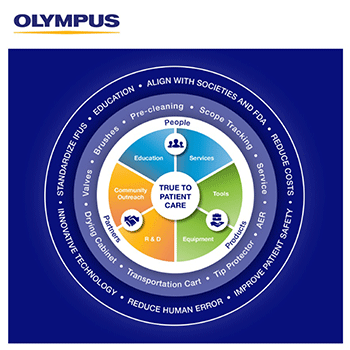Olympus Corp. of the Americas provides resources to help deliver quality patient care

CENTER VALLEY, Pa. (Oct. 18, 2022) - Olympus Corp. of the Americas reminds infection prevention professionals of the importance of elevating the standard of patient care and safety during International Infection Prevention Week, which marks the Association for Professionals in Infection Control and Epidemiology's (APIC) 50th anniversary.
"With patient safety as the driving force behind everything we do, Olympus is a trusted partner in infection prevention," said John B. Pracyk, MD, PhD, MBA, Chief Medical Safety Officer and Senior Vice President of Medical & Scientific Affairs for Olympus Corporation. "It's our responsibility to advance understanding and safety practices in infection prevention, which is why we provide advanced trainings and tools both in-person and online."
Olympus partners with APIC and other professional organizations in providing education to infection prevention professionals and helping support reprocessing standards. Two professional associations updated their reprocessing standards this year, AAMI (Association for the Advancement of Medical Instrumentation) and AORN (Association of periOperative Registered Nurses). Olympus infection prevention tools and resources align with these standards, and our suite of cleaning, disinfection and sterilization products equip infection prevention professionals to comply with recommended guidelines.
Earlier this year, AAMI released the ANSI/AAMI ST91:2021 standards for reprocessing flexible endoscopes. The updates have put an emphasis on automation to control for the variables of human factors and have introduced new drying-time standards.
Olympus hosted a webinar that identifies key changes to the AAMI ST91 guidelines and is available on-demand. In the webinar, our in-house experts interpreted how the changes may impact reprocessing procedures and the use of Olympus products.
In addition to customized resources like the webinar, Olympus offers educational resources via its global infection prevention website, where reprocessing technicians have access to training materials, processing guidance, studies and manuals. The site also provides access to product instructions for use (IFUs), which lay out the processes and equipment to reprocess scopes.
AORN recently released its own updated standards for reprocessing flexible endoscopes with a focus on drying times and the transportation and storage of scopes. While similarities exist between the updated AAMI and AORN standards, there are differences between the two standards. It's important that facilities understand the changes, and Olympus stands ready to answer questions about how they interrelate with IFUs for Olympus' products.
With infection prevention as an issue at the fore this year, the World Health Organization promoted infection prevention measures with publication earlier this year of its "Global Report on Infection Prevention and Control."
The WHO reported that infection prevention is a "problem of equity and access to quality health care" as high-income nations are far more likely than low-income countries to be making greater progress on implementing infection prevention programs and practices.1
The WHO reports that patients, especially those in low- to middle-income countries, seeking care or preventive services such as vaccinations are at risk of contracting healthcare-associated infections. Up to 70% of those infections can be prevented by implementing infection prevention and control measures, according to the report. Infection prevention also represents the potential for substantial cost savings in healthcare. Improving hand hygiene in healthcare settings could save about $16.50 in healthcare expenditures for every dollar invested, according to the WHO.1
###
About Olympus
Olympus is passionate about creating customer-driven solutions. As a leading medical technology company, Olympus uses innovative capabilities in medical technology, therapeutic intervention, and precision manufacturing to help healthcare professionals deliver diagnostic, therapeutic, and minimally invasive procedures to improve clinical outcomes, reduce overall costs, and enhance the quality of life for patients.
- World Health Organization, "Global Report on Infection Prevention and Control, executive summary," May 2022

